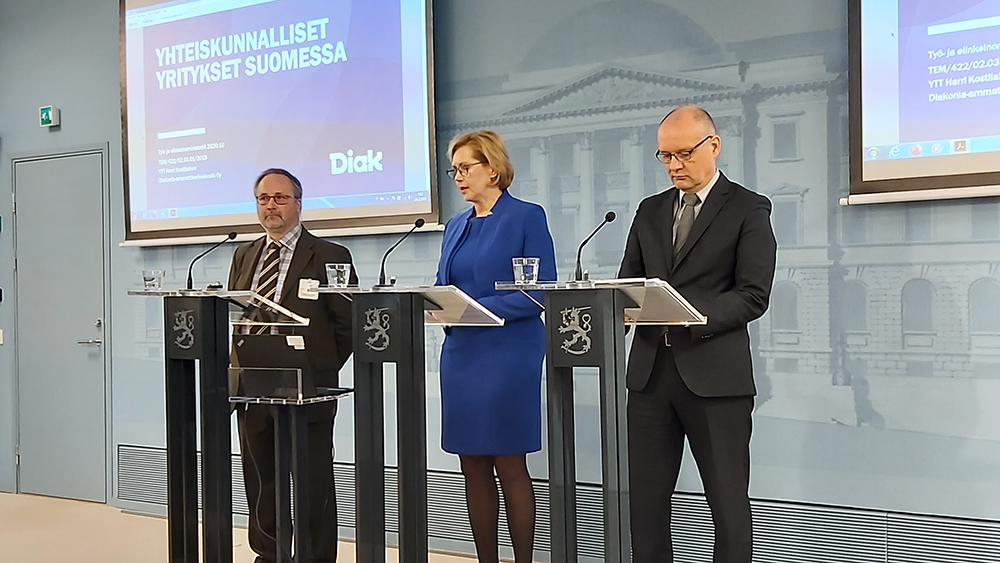Report: Social enterprises have potential for increasing the employment rate of people with partial work ability

Finland is actively seeking to promote business and the conditions for conducting business. Business creates sustainable growth and enables employment and wellbeing, including the employment of vulnerable groups.
Social enterprises have special characteristics and needs, however, that are not recognised in the current strategies and policies to support business activities. Social enterprises are not sufficiently considered in the context of promoting the conditions for conducting business. These results are presented in the report submitted to Tuula Haatainen, Minister of Employment, 26 February 2020.
In order to enable social enterprises to improve their business and employment, we should promote awareness of their activities and better identify their special characteristics. Social enterprises should also be taken into account in public employment and business services.
The Government aims to improve the conditions for social enterprises to employ people with partial work ability and other vulnerable groups. To lay a foundation for the work, Harri Kostilainen, Researcher at the Diaconia University of Applied Sciences, studied the current situation of social enterprises in Finland upon the request of the Ministry of Economic Affairs and Employment.
Social and health care services, employment and circular economy are the most common sectors for social enterprises
According to the report, there are approximately 1,700 social enterprises in Finland, with a combined turnover of nearly EUR 5.8 billion. Social enterprises operate in several sectors. According to the report, the majority operates in social and health care services, employment, environment and circular economy.
The number of jobs in social enterprises is over 50,000, based on the report. Most of these jobs are in enterprises that the Association for Finnish Work has awarded the Finnish Social Enterprise Mark (22,500 jobs) and in social and health care associations (26,500 jobs). Based on the report, these two groups have a particular potential for increasing the employment rate of people with partial work ability. Other social enterprises could also employ a significant number of people, including people with partial work ability.
“Employment of people with partial work ability is an important issue, and we will immediately start to improve the conditions for social enterprises in Finland based on this report. We will also review the needs of social enterprises in the Ministerial Working Group on Promoting Employment,” says Minister of Employment Tuula Haatainen.
Proposals to strengthen the business and employment conditions for social enterprises
To develop their business and increase employment, social enterprises need suitable measures to promote the capabilities of the business model, awareness, resources and competence, says the report. The ownership and tasks of social enterprises differ from other companies.
The report also recommends policies to promote the objective set out in the Government Programme. In addition, the report lists concrete proposals for measures to include in the strategy for promoting national social entrepreneurship.
What is a social enterprise?
- There is no established national definition for a social enterprise.
- Social enterprises have been defined in the EU legislation.
- Other EU countries may also have their own definitions for social enterprises.
- Social enterprises operate in the markets like any other companies. They have various forms of association and network with other companies.
- A social enterprise has a societal main objective, which is usually social or environmental in nature. A social enterprise reinvests the majority of the profits or surplus with a view to achieving its social objective. This has been recorded in the articles of association or rules of the association. The company’s leadership or management model reflects its mission.
- The report suggests that the definition of Finnish social enterprises could be based on the Finnish Social Enterprise
- Mark of the Association for Finnish Work.
- The criteria for the Finnish Social Enterprise Mark include defining an objective of solving social and environmental problems, dedicating most of the profits to promoting the social objective, and openness and transparency of operations.
More information:
Timo Nevaranta, Special Adviser to the Minister, Ministry of Economic Affairs and Employment, tel. +358 50 574 1430, timo.nevaranta(at)tem.fi
Lippe Koivuneva, Senior Government Adviser, Ministry of Economic Affairs and Employment, tel. +358 (0)295 049 236, lippe.koivuneva(at)tem.fi
Harri Kostilainen, Researcher, Diaconia University of Applied Sciences, tel. +358 (0)40 501 9394, harri.kostilainen(at)diak.fi
See the webstream of press conference (in Finnish): Selvitys yhteiskunnallisista yrityksistä Suomessa